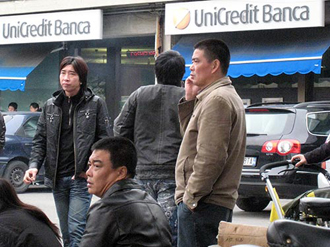Over 3,000 Chinese garment factories employing tens of thousands of Chinese are facing hard times in Prato, the Tuscan city that has surpassed Milan as the city hosting Europe’s biggest Chinese population.
As home of Italy’s textile industry, the central Italian city of Prato began attracting Chinese garment entrepreneurs in 1987, most of them from Wenzhou. The first Chinese worked for Italian companies. Within a decade most had set up their own businesses with their own Italian labels.
By 2008 Prato’s Chinese population had swelled to about 50,000, over a quarter of the city’s total population of 180,000. The majority were involved in the 3,100 garment businesses employing undocumented Chinese workers to produce low-end garments. Some were knockoffs of leading Italian luxury brands, but over 90% of these companies hired Italian designers and produced their own brands. A few even produced bags for major global brands, according to Chen Hongsheng, general secretary of Prato’s Overseas Chinese Friendship Association.
In those days Chinese workers — two-thirds of whom were illegal — could earn 15,000 to 30,000 euros ($20,295 to $40,590) a year, working 14 to 15 hours a day, Chen told the Global Times. At its peak Prato’s Chinese-run factories were producing about 30% of Italy’s garment output.
But the European debt crisis has begun taking a toll on demand for the products of Prato’s Chinese-owned sweatshops. As the Italian economy has begun to suffer, local authorities have become more aggressive about raiding illegal Chinese operations seen as harming legitimate enterprises.
“The Italians say it is a violation of regulations for working hours, but we Chinese came here to make money and we are happy to do overtime,” said Zheng Xianjie, president of the Overseas Chinese Friendship Association of Prato.
“Of course we have problems,” said Chen. “Chinese kids of rich business owners drove fancy cars in town, most Chinese companies avoided tax and employed Chinese workers without working permits. But these problems have existed for a long time. It is the debt crisis that drove the local government to take more aggressive measures.”
On June 21 500 local police officers raided 70 Chinese-owned businesses in Prato and seized assets worth 25 million euros ($34 mil.), along with 390 bank accounts, 183 vehicles and 76 properties.
“Chinese companies operating in Prato and in Florence were accumulating large amounts of cash thanks to black market sales often using counterfeit goods and illegal labor,” the police said in a statement.
Business owners sent cash back to China through money transfer agencies in dozens or even hundreds of tranches of 1,999 euros ($3,150) each, just under the legal limit of 2,000 euros, according to the police. In this way an estimated 238 million euros ($330 mil.) of untaxed earnings were remitted to China between 2007 and 2009.
Heavy fines were imposed on firms found to be violating labor and immigration laws. To avoid paying these fines, many Prato garment entrepreneurs have fled to China. But for many, returning to China is no longer an option. The second generation of Chinese immigrant are more Italian than Chinese, notes Chen. He also heads up Prato’s biggest Chinese school, with about 1,000 students, most of them born in Prato or raised there since they were infants.
“I will go nowhere,” said Zheng. “I came to Prato because there were plenty of Chinese here and the development prospects were bigger than elsewhere. I spent my entire youth here. I’ve got friends and connections here.”
Yet about 20% of Prato’s Chinese have returned or are planning to return to China as the gloomy economic climate is destroying prospects for earning a living there.


